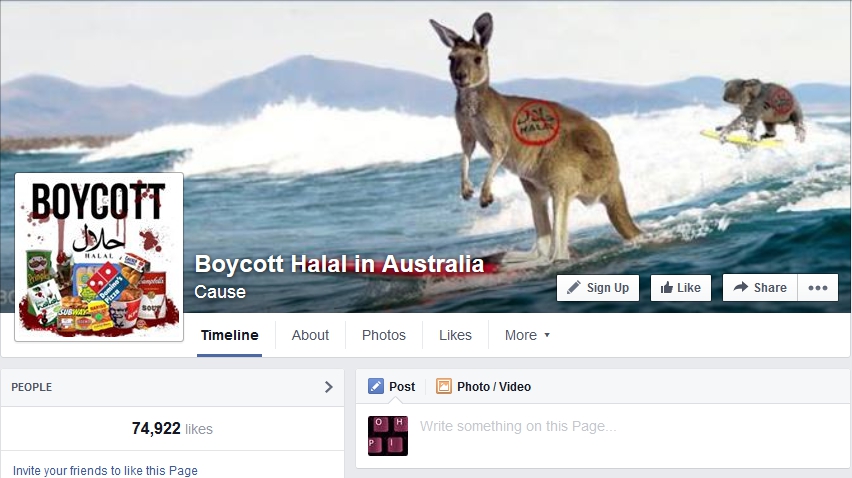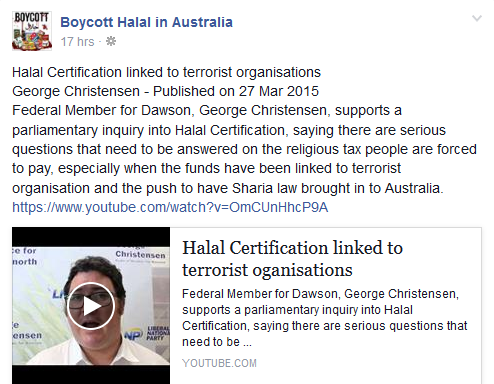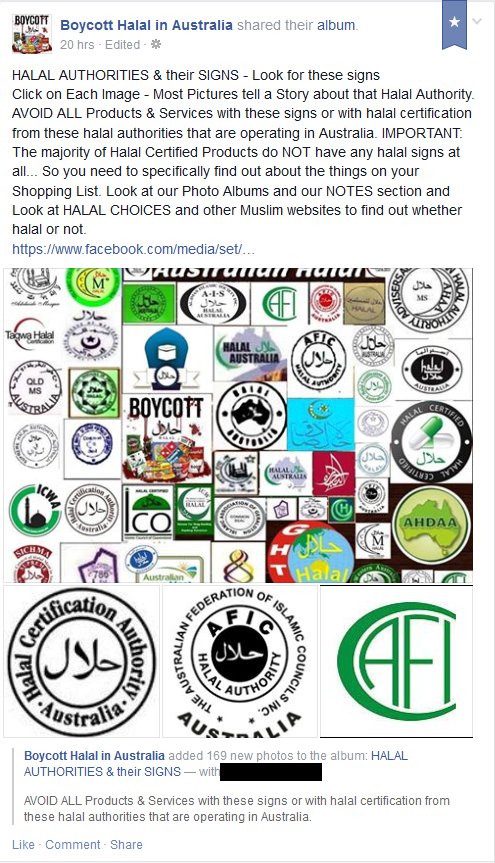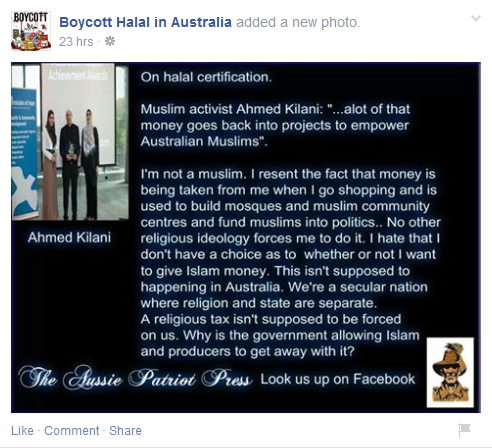The “Boycott Halal in Australia” page (ID: 131315043683974) has 77,858 supporters and has been online since October 26 2012. Significantly, it gained about 2,500 of those supporters last Saturday following news of the counter-terrorism raids in Melbourne. The Online Hate Prevention Institute has been monitoring pages like this since our December 2013 report “‘Islamophobia on the Internet: The growth of online hate targeting Muslims”.
The about page of page Boycott Halal in Australia claims their aim is to “…Boycott all companies and organisations that promote or use Halal products and services in order to reduce demand and slow production”. Hundreds of food products found in Australian supermarkets have halal certification, including household name brands such as Nestle Crunch bars, Maggi Two Minute Noodles and Kellogg’s Coco Pops .
In this briefing:
- We present a breakdown of the supporters of Boycott Halal in Australia
- We consider the nature of the bigotry behind such pages
- We share some examples from the page
- We list similar anti-halal Facebook pages
- We link to our reporting guides to help you report this content to Facebook and to FightAgainstHate.com
Who are the anti-Halal boycotters?
An examination of the page showed that about 24% of its audience was from outside Australia. The remaining 76% which is Australian is divided as follows: Queensland 32% , New South Wales 29% , Victoria 15% , Western Australia 11% , South Australia 9% , Tasmania 1% , Australian Capital Territory 1%, and Northern Territory 2%.
The nature of the anti-Muslim hate
The anti-Halal movement straddles a line between words and actions. Efforts to prevent food manufacturers having their products certified as Halal are designed to have a real impact on the ability of Muslims to live within a society. They are in short designed to exclude Muslims from society.
Anti-Halal campaigns are part of a larger anti-Muslim propaganda campaign which presents Muslims as a “threat to our way of life”. There are three basic lines of argument to this campaign. The first is the idea that Muslims want Sharia law to replace the law of the land. The second presents Muslims as a “cultural threat” for not fitting in. The third presents Muslims as an economic threat, and in particular as a drain on the welfare system. Other forms of anti-Muslim hate can also appear on such pages.
Any distinctiveness, be it in dietary requirements, dress, accommodations for prayers or holidays, or not participating in mainstream holidays, which are often Christian based, is seen as part of an attack on mainstream culture. A sense of fear about Sharia law is fostered with the suggestion that a significant Muslim population would lead to Sharia law being imposed on all citizens. This fear is increased by the suggestion that Muslims are not “integrating”, where integration does not mean participating in and contributing to society, but rather giving up Muslim values such as eating Halal food.
Max Chalmers in an article on newmatilda.com say this anti-Muslim crusade is a “an ideological disposition desperately searching for a piece of evidence to cling to. When you sift through the claims the movement makes you’re left with nothing more than an assumption that all Muslim practices are suspect until proven innocent.”
Examples from the page
Contrary to what was posted, the Australian Crime Commission (ACC) issued a statement in November 2014 saying its taskforce with AUSTRAC and the AFP had identified links between organised crime and terrorism funding. “While the proceeds of halal certification do fund Islamic organisations, Fact Check could find no evidence that this money has ever flowed to terrorist groups.”
In the statement the ACC said “The task force has identified direct links between serious and organised crime, money laundering and terrorism funding. However, the Australian Crime Commission is not aware of any direct links between the legitimate halal certification industry and money laundering or the financing of terrorist groups.”
This image is a straight forward promotion of a boycott of Halal certified products. As discussed above, the aim of such boycotts is to make it harder for Muslims to live in Australian communities, and to thereby exclude them.
Some consumers are concerned that they are paying for the certification when purchasing Halal products, however as the Australian Food and Grocery Council (AFGC) explains in their article the costs of certification for food and beverage manufacturers are negligible in terms of the total manufacturing cost base and highly unlikely to influence wholesale pricing. The article also explains that “in many cases, existing manufacturing processes and product ingredients are already compliant with Halal standards”.
Companies that pursue Halal certification generally do so in order to increase sales opportunities to a broader range of consumers, including to export markets. Bega Cheese executive chairman Barry Irvin, said in an article for the Bega District News, that the cost of Halal certification for his products was not passed onto Australian consumers, but was passed on to export customers.
Similar pages
There is a whole network of anti-Muslim hate pages / groups on Facebook, and the anti-Halal movement is a subset of this which is particularly active in Australia.
A few similar pages / groups include:
- Stop Halal Slaughter community
- Halal is Cruel
- Say no to Halal meat
- No Halal Certification in Australia
Reporting anti-Muslim hate
The Online Hate Prevention Institute maintains a set of guidelines for report online content to Facebook and other social media platforms.
The following guides may be helpful in reporting the content discussing in this briefing:
We also encourage you to report any online hate you see in Facebook, YouTube or Twitter to FightAgainstHate.com. The Fight Against Hate system was created by the Online Hate Prevention Institute to maintain a record of items members of the public have already reported to the social media companies. This allows us to track how they respond. Other NGOs, government agencies and researchers can also access the list of reported items to help them tackle the problem of online hate.
If you haven’t already done so, please join us on Facebook in our efforts against all forms of online hate. As a registered charity our work is funded through donations from the public, any help to support our important work tackling online hate is greatly appreciated.





